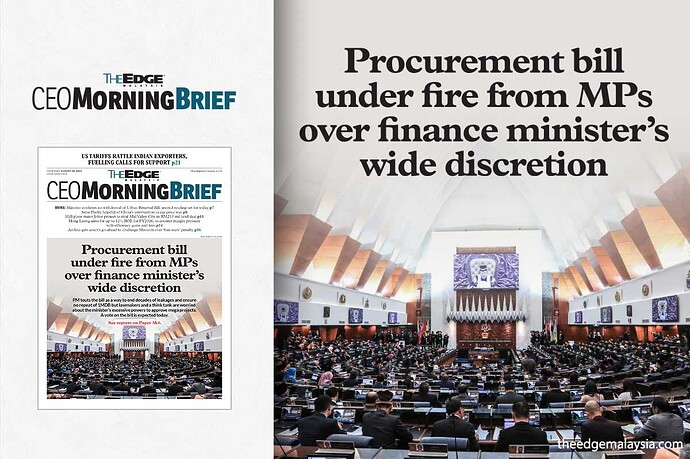KUALA LUMPUR (Aug 27): Voting on the Government Procurement Bill has been postponed amid strong criticism from the opposition and civil society groups over the sweeping powers it grants the finance minister.
The bill, which seeks to standardise procurement processes across the public sector, had initially been scheduled for debate and voting on Wednesday (Aug 27).
However, after a heated debate involving 21 members of Parliament (MPs), Communications Minister Fahmi Fadzil moved to adjourn the sitting to Thursday.
This means the house will only proceed with the finance minister’s wrap-up of the debate and the voting after the usual oral question-and-answer session on Thursday.
‘Dangerous concentration of power’
Earlier, debating the bill, several MPs voiced concern that the proposed law would give excessive powers to the finance minister in approving large government contracts.
Government backbencher Hassan Abdul Karim (PH-Pasir Gudang), for one, raised the issue that some provisions in the bill allow a single minister to approve mega contracts without a ceiling limit, bypassing procurement board recommendations in cases of a deadlock.
“Section 10(1)(a) in the First Schedule enables the minister to approve government procurements without limit. Section 12(8) further states that if the procurement board cannot reach a decision, the minister can decide alone.
“This is a dangerous concentration of power,” said Hassan, urging the government to delay the passage of the bill until stronger safeguards are introduced.
According to the bill, procurement approvals will follow tiered thresholds as outlined in the First Schedule of the bill: controlling officers, procurement boards and ministers (or menteri besar/chief minister at state level) will each have approval authority depending on contract value.
In the event of disputes, the procurement board may refer matters to the minister, whose decision will be final.
Hassan went on to argue that the minister is placed in dual roles — as both regulator and decision-maker — which he said constitutes a conflict of interest.
“I love this government but I love this country and its people even more. For billions of ringgits at stake, it is better to be late than sorry,” he added.
Prime Minister and Finance Minister Datuk Seri Anwar Ibrahim, in tabling the bill for its second reading earlier, dismissed concerns of excessive ministerial discretion.
He stressed that the proposed law reinforces checks and balances through the establishment of an independent review panel and the Government Procurement Appeal Tribunal, which can review procurement decisions, including those made by the minister.
Some government MPs, while backing the legislation, also called for certain improvements on the bill, such as the one being raised by former cabinet member Yeo Bee Yin (PH-Puchong), who stressed that the bill should widen its scope to cover public-private-partnership (PPP) projects.
Meanwhile, Pasir Mas MP Ahmad Fadhli Shaari (PN) also opposed the bill and called for it to be referred to a Parliamentary Special Select Committee (PSSC) as he described the bill as being “hastily prepared”, a view echoed by Machang MP Wan Ahmad Fayhsal Wan Ahmad Kamal (PN) and others from both blocs.
The bill, comprising 12 parts and 93 clauses, sets out a comprehensive procurement framework applicable to federal ministries, statutory bodies, state governments, local authorities and government-linked entities funded by public allocations.
At the federal level, the Secretary-General of the Treasury, currently Datuk Johan Mahmood Merican, will administer and supervise procurement, with powers to delegate functions, issue directives and ensure compliance.
State-level procurement will be overseen by respective state financial authorities.
According to the bill, any participating suppliers and contractors will first be required to register with the Registrar of Government Procurement under the Treasury before participating in tenders.
Applications will be assessed based on fitness, financial soundness and disclosure of beneficial ownership.
Registration may be refused, suspended or revoked if an entity is convicted of corruption, declared bankrupt, found in breach of competition law, provides false information or fails to comply with guidelines.
Revoked entities will be barred from reapplying under the same classification code.
All government procurement contracts, once awarded, must be executed in the form and manner prescribed by the Minister of Finance, according to the bill.
Penalties under the bill include fines of up to three times the value of the contract or RM1 million, whichever is higher, and imprisonment of up to five years for offences such as unlawful contract transfers, failure to disclose conflicts of interest and interference in active procurements.
Source:The Edge Malaysia
2025-09-09T16:00:00Z
